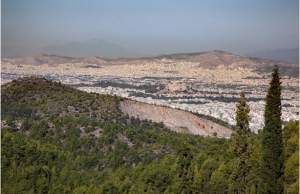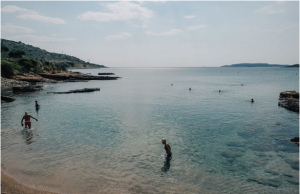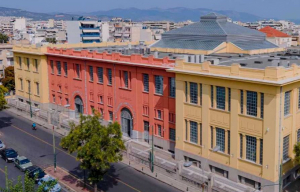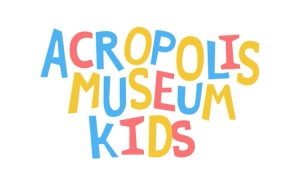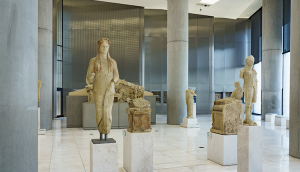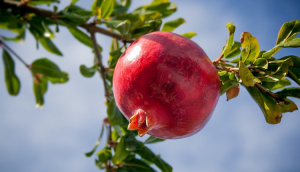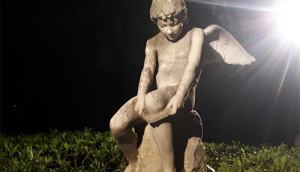XpatAthens
NASA Confirms That The Myth Of Odysseus Is Real
"We believe that the myth revolves around real events," says Panagiota Preka-Papadima, a Professor of astrophysics at the University of Athens.
She and a team of scientists have published articles in various international scientific journals and concluded that some of the events described in the Epics are real, while the natural phenomena mentioned, correspond to the time of their narration.
"Odysseus arrived in Ithaca on October 25, 1207 B.C.," they wrote. "Five days later there was a 75% solar eclipse covering the Ionian Sea and then the murder of the suitors happened," they continue.
NASA maps describing natural phenomena from 4500 B.C. to 10,000 A.D. have verified the October 25, 1207 B.C. eclipse.
Furthermore, another eclipse, which took place on October 30, 1207, from 2.30 pm to 5.30 pm, is believed to be reflected in the Odyssey. In Rhapsody Y, just before the murder, Homer describes Theoklymenos saying to the suitors:"... and the sun was gone from the sky, and a heavy darkness spread everywhere!".
"This is a description of the eclipse that covered 3/4 of the sun's disk," says Mrs. Papadima. "The date of the eclipse, October 30, 1207 B.C., is in complete agreement with the Homeric descriptions of the weather, autumnal country life, and the noontime of the murder of the suitors," continues Ms. Papadima.
Researchers have concluded that there is a historical core to the myth of Odysseus and this is a compelling revelation for science and Greek culture alike!
To read this article in full, please visit: greecehighdefinition.com
Hiking Mount Ymittos In Athens
Upon arrival you’ll quickly notice that the lack of development is part of the charm of this route. Despite its proximity to the city, you feel off grid and in discovery mode. Keeping the city as a very visible landmark, it is difficult to get lost here—but easy to feel like it. This hike will have you exploring rich olives groves, a 12th century monastery, the ruins of an old Christian basilica, a Botanical Walk, and a whole lot more!
For complete details and route information visit: thisisathens.org
Photo by: Manos Chatzikonstantis
Whether you've just arrived in town – or have been here for years – Athens always has new secrets to share!
Thank you This is Athens for your contribution as an XpatAthens Partner.
Winter Sea Swimming In Athens
To read this article in full and see what beaches are easily accessible along the riviera visit: thisisathens.org
Photo by: Georgios Makkas
Whether you've just arrived in town – or have been here for years – Athens always has new secrets to share!
Thank you This is Athens for your contribution as an XpatAthens Partner.
Old Tobacco Factory To Be Reborn As A New Art Space In Athens
Completed in 1930, the Tobacco Factory, with its distinctive bright façade, was forged in the spirit of modernism to serve the country’s booming cigarette manufacturing industry. Once a symbol of Greece’s industrialisation and progress, the historic venue will now provide a “profoundly resonant” incubator for Greek contemporary art, according to Madeleine Grynsztejn, director of the Museum of Contemporary Art Chicago, who will co-curate Portals with NEON director Elina Kountouri. The Tobacco Factory exhibition and €1 million conversion project is prompted by the bicentennial celebrations of Greece’s War of Independence from the Ottoman Empire in 1821 which led to the creation of the Modern Greek State.
The pioneering Greek art foundation NEON, backed by the billionaire Greek art philanthropist Dimitris Daskalopoulos, will renovate one half of the listed monument on Lenorman Street in order to stage an international exhibition called “Portals” from June to December, before giving the landmark space back to the Greek state as a new culture hub. The other half of the sprawling site, which spans an entire block, is home to the Hellenic Parliament Library and Printing House.
“This particular moment in history takes us through a ‘portal’. When we emerge on the other side, we will need to reaffirm - for the sake of future generations - our commitment to certain values: the rule of law, human rights and democracy.” ~ NEON Director Elina Kountouri
To learn more about this project visit: thisisathens.org
Photo courtesy of: NEON
Whether you've just arrived in town – or have been here for years – Athens always has new secrets to share!
Thank you This is Athens for your contribution as an XpatAthens Partner.
Discover The Acropolis Museum’s Website For Kids
Fun Activities At The Acropolis Museum Kids Website
1. Digital Horse Memory Game
2. Cooking Class – Ancient Edition!
Prepare an easy snack that was also eaten by the children in ancient Athens thousands of years ago!
3. Make A Iynx, An Ancient Greek Toy With A Special Sound
Spin it, stretch it, and then let it go! That’s how you play the so called iynx, a kid’s game that was particularly popular in ancient Athens with a really curious history.
For more information and fun activities, please visit: acropolismuseumkids.gr
The Acropolis Museum’s Entire Collection Goes Digital
To read this article in full, please visit: ekathimerini.gr
The Celebration Of Epiphany In Greece
Click here to listen to the song. If you are curious to see how children sing the Epiphany carols, click here.
On the morning of January 6th, people gather at a specific waterside location where the priest throws the cross in the water. Depending on the region, the cross is thrown in the sea, river, or lake. In mountainous areas or in Athens, the cross can also be thrown in a fountain.
The Epiphany tradition goes back to ancient Greece, and particularly to a feast which was called “Plintiria” (=washing machines). During this feast, the Athenians carried the statue of Athena to the coast of Faliro (close to Piraeus) to wash it in the sea, to make sure it would keep its magic powers.
Don't forget that on January 6th, a lot of people have their Name Day as well: Fotis, Foteini, Theofanis, Theofania, Fani, Ourania, Iordanis. You can wish them: Xronia Polla! Χρόνια Πολλά!
If you want to learn other Greek wishes you can use for Name Days, National Holidays or Social Occasions, you are welcome to download the “Greek Wishes For Social Occasions” FREE eBOOK, including Audio for the correct pronunciation.
Omilo Greek Language and Culture inspires people from all over the world to learn Greek, while exploring Greece. They offer 1- and 2-week courses for adults that combine beautiful course locations, experienced teachers, and a balanced combination of Greek classes with cultural activities. All these make Omilo a place where people enjoy learning modern Greek and have fun.
Besides the courses, Omilo also creates online publications to help adults expand their language skills through Language Books and eBooks for different language levels.
Pomegranate And Onion: A Greek New Year's Lucky Charms
The Pomegranate
The Pomegranate In Greek Mythology
This beautiful red fruit was a symbol of fertility and rebirth in ancient Greece. Many goddesses had it as their symbol: Hera, the goddess of marriage, Aphrodite (Venus) the goddess of beauty and Persephone, daughter of Demeter, who brought the spring while also being the Queen of the Underworld.
The Onion – A Greek New Year’s Lucky Charm!
From ancient times until now this onion-like, wild-growing plant has been a symbol of fertility and purification. Onions are viewed as highly fertile because the bulbs seem to want to sprout, even if they are being left alone. When it is out of the ground, kept in a shady corner of the house, it still grows leaves. Therefore, the onion is a symbol of fertility and is hung on a door in the household – to help the people grow and experience a rebirth of their own in the coming year.
We hope both the onion and pomegranate will bring you good luck for the new year.

Masaresi.com was founded by Maya Cornelissens-Andreadi, who shares her experience about how “to integrate in Greece and feel like a local”. Masaresi = μας αρέσει = we like it! Discover the “real Greece," while delving into all the aspects of Greek life – from modern lifestyle and culture to history, literature, traditions, and many more.
Explore Greece - Read About Greece - Buy Greek - Learn Greek
Statues At Zappeion Gardens Come To Light
Until recently, the statues became shrouded in darkness at night, making their beauty disappear in the dark. However, about a year ago, Christina Vagena, the chairwoman of the Olympia and Bequests Committee that manages the historic site, decided to reach out to Eleftheria Deko – who recently designed the new lighting system of the Acropolis – to create the new lighting system for 17 of the Zappeion statues. This is worth noting that the internationally acclaimed lighting designer offered her services pro bono.
“It was an enormous honor for such a charismatic professional to offer her assistance free of charge and to breathe new life into the sculptures. When the pandemic blows over, all Athenians will have the pleasure of rediscovering them and enjoying them.”, stated Christina Vagena.
To read this article in full, please visit: greece-is.com
Photo: "Eros", by Georgios Vroutos. © Pavlos Zafiropoulos
Show Love To Your Children This Christmas And Every Day
![]()
If there’s a topic you’re interested in and would like to learn more about you may contact me via email. For more information about me and my work check the XpatAthens Directory or visit my website. Because this is your life!


